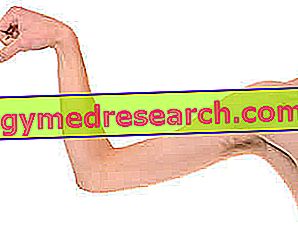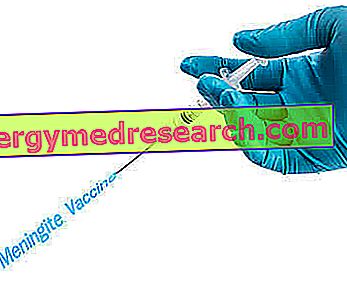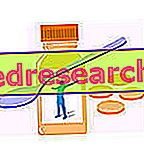Muscle catabolism refers to the significant and objective and measurable loss of contractile fibrocells (or their section).

In certain sports practices (based on various expressions of strength), anabolism overcomes catabolism by increasing muscle mass. On the other hand, in other conditions (pathological or caused by inappropriate behavior) the ability to reconstruct muscle tissue after catabolism is not effective or efficient enough.
This latter mechanism, if continued over time, is responsible for the muscular catabolism proper (clinically detectable and incisive on the state of health).
What to do
- First of all it is necessary to understand if it is indeed a question of muscular catabolism. As anticipated, to be defined as such, it is necessary that it possesses at least the requirements of:
- Circumference reduction.
- Mass reduction.
- Strength reduction.
- Many sportsmen, or rather many bodybuilders, think they suffer from muscle catabolism; however it is almost never correct. The reduction of the section and of the mass within certain limits, without the loss of strength (especially in athletes who train themselves in muscle training) excludes the possibility of catabolism. On the contrary, it is most likely a question of:
- Intramuscular fat loss: due to effective weight loss (cutting or definition).
- Loss of trophism: reduction of glycogen, solutes (creatine phosphate, mineral salts, etc.) and intracellular water. It is mainly due to:
- Business interruption: when possible, the solution is not to interrupt the training and carry out the so-called maintenance.
- Dehydration: a sportsman should take a quantity of water equal to 1 milliliter per calorie of the diet and add how much is lost with the specific activity (variable from subject to subject).
- Malnutrition or unsuitable diet.
- Poor recovery and lack of sleep.
- Excessive aerobic activity.
- Overtraining.
- Cases of muscle catabolism "proper" in sportsmen are quite rare, but not impossible. We summarize the most frequent reasons and the remedy to be adopted:
- General malnutrition: it is advisable to follow a normocaloric diet, varied and possibly supported by dietary supplements.
- Energy deficiency: absolute and referring above all to glucose deficit. It occurs mainly in athletes who follow low-carbohydrate diets. It forces the body to break down muscle proteins to produce energy. It is necessary to consume at least 45% of the energy in the form of carbohydrates.
- General protein deficiency or high biological value peptides: frequent in vegan athletes (even more so in raw foodists) who do not adapt the diet to their own needs; is caused by the deficiency of essential amino acids and has the same effects mentioned in the energy shortage. It is necessary to consume daily foods with proteins of high biological value or, at least, to associate different vegetable protein sources so that one compensates the deficiencies of the other.
- Frequent aerobic workouts with total exhaustion: in addition to being useless, they are inadvisable, as they have a duration and intensity such as to initiate catabolism significantly (due to the zeroing of glycogen); however, they raise cortisol levels excessively. It is sufficient to rationally plan the sessions with well-defined periodic objectives.
- Insufficient recovery and sleep: do not allow to restore the basal condition, nor to progress physically. It is essential to increase recoveries (or reduce the intensity of training) and try to improve sleep.
- Overtraining: see Overtraining Remedies.
- There are many other reasons for muscle catabolism. Some are severe and require important medical treatment (drugs, surgery, etc.). Below we will list the main ones. We will not specify medical treatment as it would come out of the relevance of this article.
- Malnutrition:
- Generalized: including vitamins and minerals.
- Protein deficiency and Kwashiorkor
- Carbohydrate insufficiency and prolonged ketogeny.
- If associated with fat deficiency, it can give rise to "rabbit starvation".
- Malnutrition associated with psychiatric pictures (anorexia).
- Serious infectious diseases:
- AIDS.
- Viral hepatitis.
- Infectious pancreatitis.
- Pneumonia etc.
- Severe burns.
- Defects of the hormonal axis.
- Hyperthyroidism: especially when not compensated pharmacologically and in the presence of insufficient diet.
- Hypothalamic-pituitary axis disorders: impaired somatotropic hormone release.
- Hypoinsulinemia and / or chronic hyperglucagonemia: the first is typical of insulin-dependent type 1 diabetes mellitus and the second of permanent glycogen deficiency (hepatic disorders such as cirrhosis).
- Hypercortisolemia and Cushing's Syndrome.
- Hypogonadism and testosterone deficiency.
- Immobilization:
- Bone invoices.
- Coma.
- Neurological disorders:
- Dejerine-Sottas syndrome
- Diabetic neuropathy.
- Amyotrophic lateral sclerosis.
- Guillain-Barré syndrome.
- Spinal cord injury.
- Poliomyelitis.
- Insufficiency of one or more organs: hepatic, kidney, respiratory (COPD) and cardiac (especially congestive).
- Diseases of the digestive system:
- Oral pathologies.
- Dysphagia in the elderly.
- Insufficiency of exocrine gastric and / or biliary and / or pancreatic secretion.
- Alteration of intestinal absorption (eg due to surgical resection).
- Infection or intestinal parasitosis.
What NOT to do
These attitudes are contraindicated as they favor both the loss of tropism and muscle catabolism:
- Stop sporting activity.
- Dehydrate.
- Following an incorrect diet:
- Lack of total energy.
- Carbohydrate deficiency.
- Lack of high biological value proteins.
- Recover insufficiently.
- Sleep little and badly.
- Exceed the volume and intensity of aerobic activity.
- Do not cure overtraining.
- Neglecting the more or less serious pathologies that can cause or contribute to muscle catabolism.
What to eat
The dietary principles to avoid muscle catabolism, regardless of the type of sporting activity (but adjusting the portion), are:
- Normocaloric diet: energy must be sufficient to maintain constant weight. It is the sum of all the calorie expenditure (basal metabolism, normal physical activity and motor practice).
- Diet appropriately distributed among the energy macronutrients: the correct distribution is more or less the following:
- Proteins: as high as possible with a high biological value. They must be present in quantities of 1.2-1.7g per kilogram of normal weight. Over 1.8g / kg of total weight shows an excessive increase in amino acid oxidation.
- Lipids: better if predominantly of vegetable origin, such as cold-pressed oils. Cholesterol and saturated fats must remain within normal limits. It is necessary to pay attention to satisfying the request in essential lipids (omega 3 and omega 6, equal to 2.5% of total calories). In all, the fat should correspond to 30% of the energy. NB . Good lipid sources also help to reach the quotas of fat-soluble vitamins; they also provide phytosterols and plant lecithins.
- Carbohydrates: they take up all the remaining calories (around 55-60%). The monosaccharides (glucose, fructose and galactose) and the disaccharides (maltose, sucrose and lactose) should not exceed 12-16% of calories, but consuming a lot of fruit, vegetables, milk and yogurt is frequent up to 20%. In this case it is advisable not to consume foods sweetened with sugar.
- Diet appropriately distributed between meals: meals (or supplements) that precede and follow the training must have the right importance; for endurance activities it is advisable to eat / integrate also during the session. If the session has a commitment of 1000kcal and causes a loss of sweat equal to 2 liters (water and minerals), what is introduced before, during and after must be adequate.
- 1.5 hours before the activity: provide digestible foods but with low or medium glycemic index. For the reasons we have already described, it is necessary to guarantee the "gasoline", sufficient to the effort consuming food and supplements. Because of digestion it is not possible to overfill the stomach and the glycogen stores (muscle and liver) will take care of the remaining needs. Some examples are: not too sweet fruit, whole wheat pasta and bread.
- Alternatively, it is possible to choose foods with a high glycemic index immediately before and during the activity: some examples are honey, maple syrup, sweet fruit (if necessary peeled), boiled white rice and boiled potatoes.
- High glycemic index foods immediately after the activity: the same ones just mentioned.
- Fresh foods, mostly raw: to maintain the concentration of mineral salts (especially potassium) and vitamins (especially vitamin C and folic acid). Particular attention must be paid to the quantity of vegetables and fruits. To avoid excess fiber, it is advisable to peel all types of fruit (aubergines, apples, pears, cucumbers, etc.).
- High biological value protein sources: eggs, meat, fishery products, milk and derivatives. There are vegan alternatives such as the combination of soy (also fermented), various seeds (oily like dried fruit and starchy cereals, legumes and pseudocereals) and algae.
What NOT to Eat
- Alcohol.
- Packaged foods: they are poor in vitamins, minerals, polyphenolic antioxidants etc.
- Junk foods (snacks, sweet drinks, milkshakes, fast-food): they bring more harmful molecules and do not meet the nutritional requirements of a sportsman.
- Monothematic diets (carnivorous, vegan, etc.): they are always lacking in some nutrients.
- Dry foods: they are lacking in water and rich in sodium. They make it more difficult to maintain hydration.
NB . It is advisable to avoid prolonged fasts.
Natural Cures and Remedies
- Supplements:
- Proteins: to be taken mainly as a substitute meal together with food. They have the advantage of being more conservable and transportable than protein foods.
- Maltodextrin or vitargo: they have an anticatabolic function and support training. They should be diluted in water and sometimes accompanied by vitamins and mineral salts. They represent an almost instantaneous energy source.
- Branched chain fatty acids (BCAA): to be taken in quantities of 1g per 10kg of normal weight. They have an anticatabolic function and must be employed (dividing them) before, during and after the session. The amount varies according to the snacks that precede and follow the training.
- Essential amino acids: useful for vegans, they can also be taken away from training.
- Arginine and glutamine amino acids: of dubious efficacy. They should promote muscle recovery and support different cellular / metabolic functions.
- Creatine: available in various forms (monohydrate, alkaline, etc.). It is an intramuscular energy substrate (creatine phosphate) that supports alattacid anaerobic exercise. The more there is in the muscles, the less carbohydrates are consumed and the less lactic acid is released during very short and intense, even repeated efforts. Several studies suggest that some people are unable to absorb / metabolize it properly. The dose is about 2-3g / day for every 36kg of lean mass for constant intake and 6-9g / day for every 36kg of lean mass for loading-unloading. It should be taken alone, diluted, on an empty stomach and possibly with few pure carbohydrates to improve metabolism.
Pharmacological care
Pharmacological treatments are exclusively reserved for the pathological causes of muscle catabolism and are highly specific.
Prevention
The prevention of muscle catabolism can be briefly summarized in the following recommendations:
- Follow a proper diet.
- Schedule workouts in relation to your lifestyle to ensure recovery.
- Total recovery between sessions.
- Get enough sleep and avoid inappropriate behavior (long fasts, alcohol abuse, smoking etc.).
Medical Treatments
Medical treatments are exclusively reserved for the pathological causes of muscle catabolism and are highly specific.



